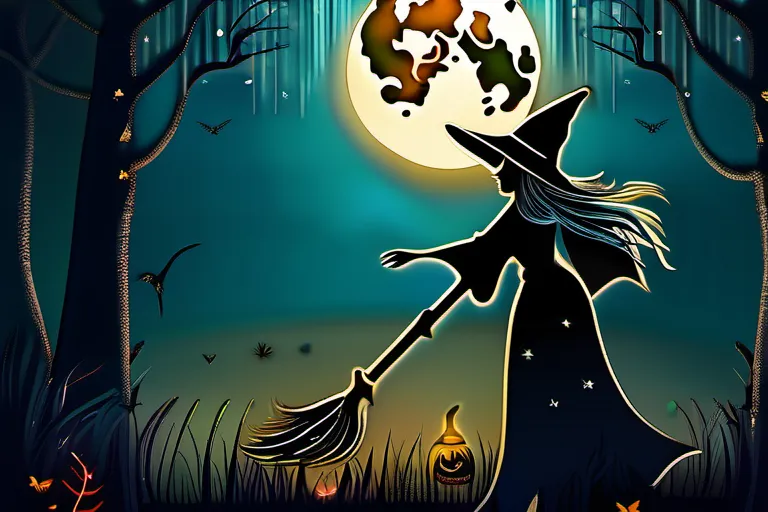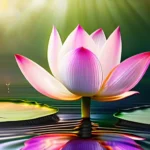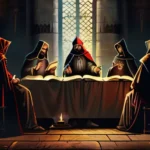Explore the history, beliefs, practices, and more of this ancient pagan religion.
Wicca is an ancient pagan religion that has gained popularity in recent years. This comprehensive guide will delve into the history, beliefs, practices, and more of Wicca, providing you with a deep understanding of this fascinating spiritual path.
The Origins of Wicca
The origins of Wicca are like a thread woven through the fabric of time, tracing back to the ancient tapestries of pre-Christian Europe. Could we really believe that the practices and rituals we see today have their roots in long-forgotten civilizations? In fact, many scholars argue that modern Wicca draws heavily from Celtic and Germanic traditions, where nature worship and reverence for the divine were integral parts of daily life.
The revival of Wicca in the 20th century is a fascinating story. How did this ancient practice resurface after being suppressed for centuries? The 1950s saw the emergence of Gerald Gardner, who claimed to have been initiated into an initiatory lineage that dated back to medieval times. Gardner’s writings and teachings laid the foundation for what is now known as Wicca.
The blending of diverse influences further enriched this new spiritual path. Is it not interesting how the teachings of Aleister Crowley, Margaret Murray, and others contributed to its development? These figures brought together elements from various sources, creating a unique synthesis that resonates with many people today. The result is a practice that celebrates the natural world, honors the Goddess and God, and embraces a holistic view of existence.
The 20th-century revival also saw Wicca moving beyond its initial esoteric roots to become a more accessible spiritual path for the general public. How did this transformation impact its spread and acceptance? As Wiccan communities grew, so too did the availability of resources such as books, rituals, and online forums, making it easier than ever for individuals to explore and practice Wicca.
The journey from ancient roots to modern-day practice is a testament to the enduring power of spirituality. How does this history shape our understanding of what Wicca truly means today? The story of Wicca’s origins serves as both an inspiration and a guide, reminding us that spiritual traditions can evolve while maintaining their core essence.
As we delve deeper into the core beliefs and principles of Wicca in the following chapters, let us reflect on this rich tapestry of history. How does understanding its origins enhance our appreciation for what Wicca represents?
Remember that every chapter builds upon the last; the more we understand about the roots of Wicca, the better equipped we are to explore its beliefs and practices in greater detail.
Core Beliefs and Principles
Core Beliefs and Principles: The Framework of Wiccan Faith
When delving into the heart of Wicca, one cannot bypass its core beliefs and principles. These foundational tenets serve as a beacon guiding practitioners through their spiritual journey. Have you ever wondered what makes Wicca so distinct from other faiths? It all comes down to these eight principles that form the bedrock of Wiccan belief.
First, let’s talk about The Rede. This central principle states: ‘An it harm none, do as ye will.’ It encapsulates a deep respect for personal freedom and responsibility. How can one interpret this in their everyday life? Is the concept of ‘harm’ limited to physical actions, or does it extend to emotional and spiritual well-being?
The Wiccan Laws of Three and Return are another pair of guiding lights. The third law suggests that whatever energy you send out into the universe, threefold will come back to you. This is a powerful reminder of the interconnectedness of all things. Can you imagine living with this awareness every day? How might your actions change if you knew everything you did would return to you in triplicate?
The principles of Imagination, Skepticism, and Intuition also play pivotal roles. Wicca encourages believers to use their imagination in creating rituals and spells, fostering a creative outlet that can be both fun and transformative. Skepticism is seen as a virtue, pushing practitioners to question and explore every facet of their beliefs. Intuition is honored as a powerful tool for discerning truth beyond the physical realm.
Lastly, let’s not forget the Sabbats. These seasonal celebrations mark the turning points in nature’s cycle, aligning Wiccans with the rhythms of the earth. How do these times of celebration and reflection integrate into your spiritual life? Do you feel a connection to the natural world during these festivals?
By embracing these principles, Wiccan practitioners navigate their path with purpose and mindfulness. It’s like charting a course through uncharted waters, where every step is deliberate and meaningful. Are you ready to explore this intricate map of beliefs and practices that have guided countless individuals for generations? The journey awaits, and the key lies in understanding these core tenets.
Wiccan Practices and Rituals
When we talk about Wiccan practices and rituals, it’s like stepping into a garden where every flower has its purpose and meaning. Imagine a pentacle, for instance—it’s not just a symbol; it’s a gateway to magical energies. How do you harness these energies? By casting spells! But what exactly is a spell in the context of Wicca?
A spell can be as simple as saying a few words with intent or as complex as creating a potion and performing a ritual. It’s like weaving a tapestry where each thread represents an element, from earth to spirit. The wand is another crucial tool, often seen as a symbol of the Will, much like a conductor’s baton guides an orchestra.
Now, let’s talk about divination. This practice involves predicting future events or gaining insights into past and present situations using various methods such as tarot cards, runes, or scrying mirrors. It’s almost like peering through the veil that separates our world from the Otherworld. How do you choose which method to use? The answer lies in intuition and the specific purpose of your divination.
One might wonder, how do these practices fit into everyday life? In Wicca, they serve as a way to connect with the divine, whether that’s through nature or inner spirituality. By engaging in these rituals, practitioners feel more aligned with their values and beliefs. It’s like tuning your radio to find the perfect station—each practice resonates differently for different individuals.
So, how do you begin? Start by exploring which tools and practices resonate most with you. Whether it’s lighting a candle during a spell or using divination cards, these are not just rituals; they are steps on your path to deeper understanding and personal growth in Wiccan spirituality.
The Modern Practice of Wicca
How do modern Wiccans practice their faith, and what roles do covens play in this journey? Let’s dive into the vibrant world of Wiccan practitioners today.
Covens—these are the heartbeats of the Wiccan community. Imagine a group of like-minded individuals coming together, much like a choir singing in harmony. Covens vary widely; some have strict guidelines and formal structures, while others are more relaxed and informal. But what connects them all is the shared commitment to magick and spiritual growth.
In these covens, members often engage in regular meetings where they share insights, perform rituals, and support one another. It’s a blend of personal practice and communal effort, much like the layers of soil that nourish a vibrant garden. The leader, or High Priestess/Priest, guides the group through their collective journey.
But not everyone is part of a coven. Many Wiccans choose to go solo, practicing their craft in solitude. Solitary practitioners often follow personal paths and draw from various sources, making their practice unique yet deeply personal. It’s like having your own little forest retreat, where you can connect with nature and the divine at your own pace.
The Wiccan community is diverse, with countless individuals finding meaning and connection through their practice. Social media platforms have become a powerful tool for these practitioners to share knowledge, offer support, and celebrate their beliefs. It’s like a virtual tapestry, woven with threads of stories and experiences from people all over the world.
As Wicca continues to grow in popularity, more individuals are embracing this ancient path. Whether in a coven or alone, each practitioner contributes to the rich fabric of modern Wiccan practice. The question remains: What magick can you perform today to enrich your life and the lives around you?
Wiccan Deities and Symbols
Imagine a world where ancient deities whisper secrets through the wind, and symbols carry more weight than mere ink on paper. Wicca, this fascinating pagan religion, has a rich tapestry woven from myths, beliefs, and practices that date back to prehistoric times. How do Wiccans view their deities? And what role do these symbols play in their rituals and daily lives?
The heart of Wicca lies in its pantheon of deities, often centered around the Goddess and the Horned God. The Goddess is seen as a symbol of fertility, wisdom, and nurturing, embodying all that is nurturing and life-giving. She represents the earth, moon, and cycles of nature. Is it any wonder why many Wiccans see her as a mother figure who watches over them?
The Horned God, on the other hand, symbolizes masculinity, strength, and the wild. He is associated with the sun, hunting, and fertility. Many Wiccans view him as a protector and a guide. Imagine these deities as two sides of the same coin, complementary forces that balance each other in the natural world.
Symbols play a crucial role in Wiccan practice. One of the most recognizable symbols is the pentacle—a five-pointed star within a circle. It represents the elements—earth, air, fire, water, and spirit—and is used to focus energy during rituals. Another symbol, the triple moon, honors the Goddess through her maiden, mother, and crone aspects. These symbols are not just decorative; they carry deep spiritual significance.
During rituals, these deities and symbols come alive as Wiccans call upon them for guidance, protection, and wisdom. The act of invoking the Horned God or the Goddess is a way to connect with nature and the forces that govern it. Isn’t this a beautiful metaphor for uniting our human essence with the natural world?
The use of symbols and deities in Wiccan practice is a profound expression of the religion’s belief in the interconnectedness of all things. Through these elements, practitioners seek to understand their place in the larger tapestry of life, seeking balance, harmony, and connection.
The Ethics of Wicca
When delving into the heart of Wiccan ethics, one cannot overlook the profound impact of the Threefold Law and the importance of living in harmony with nature. These principles act as a moral compass for Wiccans, guiding their actions and decisions every day.
Imagine you’re walking through a dense forest, where every tree whispers tales of ancient wisdom. Each step you take resonates with the spirit of nature, reminding you that everything is interconnected. This is the essence of living in harmony with nature for Wiccans. It’s not just about protecting the environment; it’s about recognizing your place within the greater web of life and acting accordingly.
The Threefold Law, on the other hand, can be seen as a cosmic mirror. When you cast an action into the world, like tossing a pebble into a pond, three ripples are created. This law teaches that every good or harmful deed will return to the doer with equal force. How many times have we wondered about the unseen consequences of our choices? The Threefold Law serves as a reminder to act with intention and awareness.
Consider for a moment: If you were to steal something, would it bring joy or sorrow? The answer often lies not in the immediate result but in the long-term repercussions. Wiccans see this as a powerful tool for self-reflection and personal growth. It encourages them to think deeply before acting, ensuring that their actions are aligned with their values of love, respect, and harmony.
But how does one live by these principles? By embracing the cycle of life—birth, growth, death, and rebirth—and finding ways to support this natural flow in all aspects of life. Whether it’s through environmental activism, compassionate community service, or simply living mindfully, Wiccans strive to embody these ethical guidelines.
In essence, understanding the ethics of Wicca is like discovering a map that guides you through uncharted territories of morality and spirituality. It teaches us that our actions have consequences, and it empowers us to make choices that resonate with love and respect for all beings. This journey isn’t always easy, but it’s undeniably enriching.
Conclusion
 By the end of this article, you’ll have a solid grasp of what Wicca is, its origins, core principles, and how it differs from other pagan religions. You’ll also gain insights into the modern practice of Wicca and its growing community.
By the end of this article, you’ll have a solid grasp of what Wicca is, its origins, core principles, and how it differs from other pagan religions. You’ll also gain insights into the modern practice of Wicca and its growing community.











